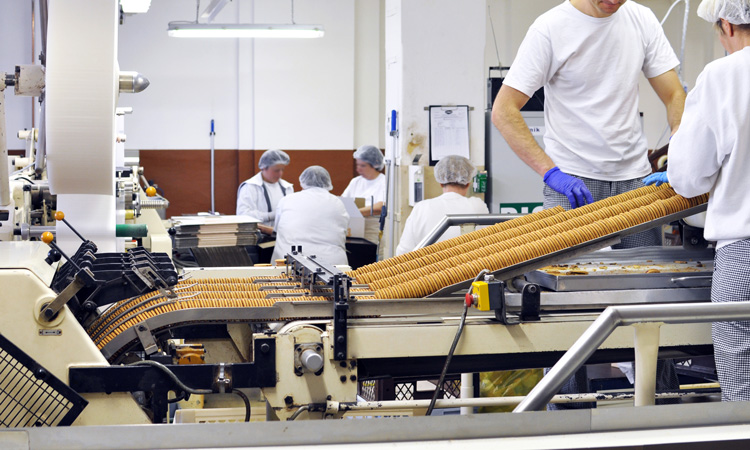Supporting the food industry with food grade lubricants
- Like
- Digg
- Del
- Tumblr
- VKontakte
- Buffer
- Love This
- Odnoklassniki
- Meneame
- Blogger
- Amazon
- Yahoo Mail
- Gmail
- AOL
- Newsvine
- HackerNews
- Evernote
- MySpace
- Mail.ru
- Viadeo
- Line
- Comments
- Yummly
- SMS
- Viber
- Telegram
- Subscribe
- Skype
- Facebook Messenger
- Kakao
- LiveJournal
- Yammer
- Edgar
- Fintel
- Mix
- Instapaper
- Copy Link
Posted: 18 November 2019 | Andre Adam - FRAGOL AG | No comments yet
What are the biggest challenges in the lubricant industry right now and how can legislation ensure food safety? Andre Adam shares his expert insight.


On 5 November 2019 the Food Grade Lubricants Working Group, by the European Lubricating Grease Institute, had their autumn meeting in Amsterdam. This group deals with all problems the lubricant industry is confronted with, focusing on the legislation side of the applications and the concerns that we receive from the users of lubricants.
We try to assist the foodstuff producers by informing and education, this includes auditors of food production sites who often have insufficient familiarity with lubricants and their use.
Food grade lubricants are an important part of any Hazard Analysis and Critical Control Point (HACCP) for foodstuff producers and secondary material suppliers
Food grade lubricants are an important part of any Hazard Analysis and Critical Control Point (HACCP) for foodstuff producers and secondary material suppliers in the food and pharmaceutical industry. The EU has no specific legislation related to lubricants and for that reason, the industry takes its direction from the programme used in the US.
Discussions on H1
Lubricants, for incidental food contact, are registered as H1 and these products are made of components approved by the US Food and Drugs Administration (FDA), something that also includes maximum levels of ingredients that can be in a final formulation. Lubricants produced under the ISO21469 standard will be guaranteed that the H1 registration is indeed done as originally submitted.
During our meeting we (once again) discussed the mineral oil saturated hydrocarbons (MOSH) and mineral oil aromatic hydrocarbons (MOAH) concerns in the market. Food Watch, the European advocacy group that focuses on protecting consumer rights as they pertain to food quality, keeps drawing attention to this topic, publishing regular articles and “tests” where they report mineral oil found in food.
Photos of black goo-like liquid, representing perhaps, old engine oil or crude oil, around children’s chocolate, have been used. While mineral oil and links to cancer feature in most reports. The messages are short but have a large impact for the named producers – a message that is incorrect where it concerns lubricants.
The fact that MOSH and MOAH are found in food does not mean it is from a lubricant. The skin of an apple contains MOSH and it is put there by nature. MOSH has a proven positive effect in many applications and have been approved for use in many products and pharmaceutical applications by the European Food Safety Authority (EFSA).
MOAH can be in food from multiple other sources including air pollution. What is proven is that the MOAH that is present in lubricants is not causing cancer. This has been evidenced by over 40 years of studies and accepted by the Bundesinstitut fur Risikobewertung (BFR), a leading governmental body in Germany and leading in this field in the EU.
Crude oil will cause cancer, but the products that you source as lubricants are highly refined base oils, and all base oils are tested before leaving a refinery to prove they have been properly treated to eliminate this risk. The main problem lies in the word mineral oil. There is no simple definition for this. It is a very complex number of molecules and they exist in uncountable number of origins in nature including oil. So, if you find these in a food sample it will be very difficult to point to a source.
Additionally, we can conclude that the test methods used on the final food are weak in accuracy and reproducibility, resulting in large differences between laboratories. You should treat the results merely as an indication.
Discussions on H2
H2 was also covered during our meeting. Still, companies and auditors are confused in the use and application of products branded H2. Today, nearly every industrial lubricant can pass this registration and although H1 registration body NSF, for example, continues to register these products, they should be avoided in a food processing area.
Staff might pick the lube because it carries the registration mark like NSF, but it is not allowed for incidental food contact. Only good education of the staff can avoid wrong application. Or better, do not use them at all – there are good H1 alternatives. The European Hygenic Engineering and Design Group (EHEDG) strongly advises their members that H2 is not suitable for use in a food processing plant.
Only good education of the staff can avoid wrong application
Registration bodies
During the Amsterdam meeting we were pleasantly surprised to learn that a new company has entered the market for registrations. Some months ago, InS services was bought by the market leader NSF from the US. In effect, this meant that there was only one company doing the service of registering lubricants. This development was seen by the European Lubricating Grease Institute (ELGI) and Union of the European Lubricants Industry (UEIL) as an unwanted development, because lack of competition cannot be beneficial for the lubricant customers for a number of reasons.
The new company, 2Probity, a H1 registration body, is based in Sweden and they started their registration programme on November first. They are part of an auditing company and they bring a lot of experience with them and should prove a needed and most welcome addition to the lubricant industry.
Our next meeting will be in Hamburg on 25 April 2020 and anybody who is interested and or wants to contribute is welcome. Participating at the working group is free of charge. Of course, this could also be a good opportunity to visit the ELGI annual conference and learn more of greases and lubricants whilst taking some quality time in the beautiful city of Hamburg.
About the author
Andre Adam is the International Sales Director at FRAGOL AG, a German based Specialty Lubricants developer and producer of private label products with focus on Food Safe lubricants and compressor and vacuum application fluids. Andre now has more than 35 years of experience in the lubricant industry working for Castrol, Petro-Canada and Anderol in many countries.
As Chairman of the H1 Global Food Lubricants Workgroup under the ELGI (as well as board member of the ELGI) and as contributor of CONCAWE-MOCRINIS work group, he continues to promote the interests of the lubricant industry in the food segment.
Related topics
Food Grade Lubricants, Food Safety, Health & Nutrition, Hygiene, Regulation & Legislation, Supply chain









